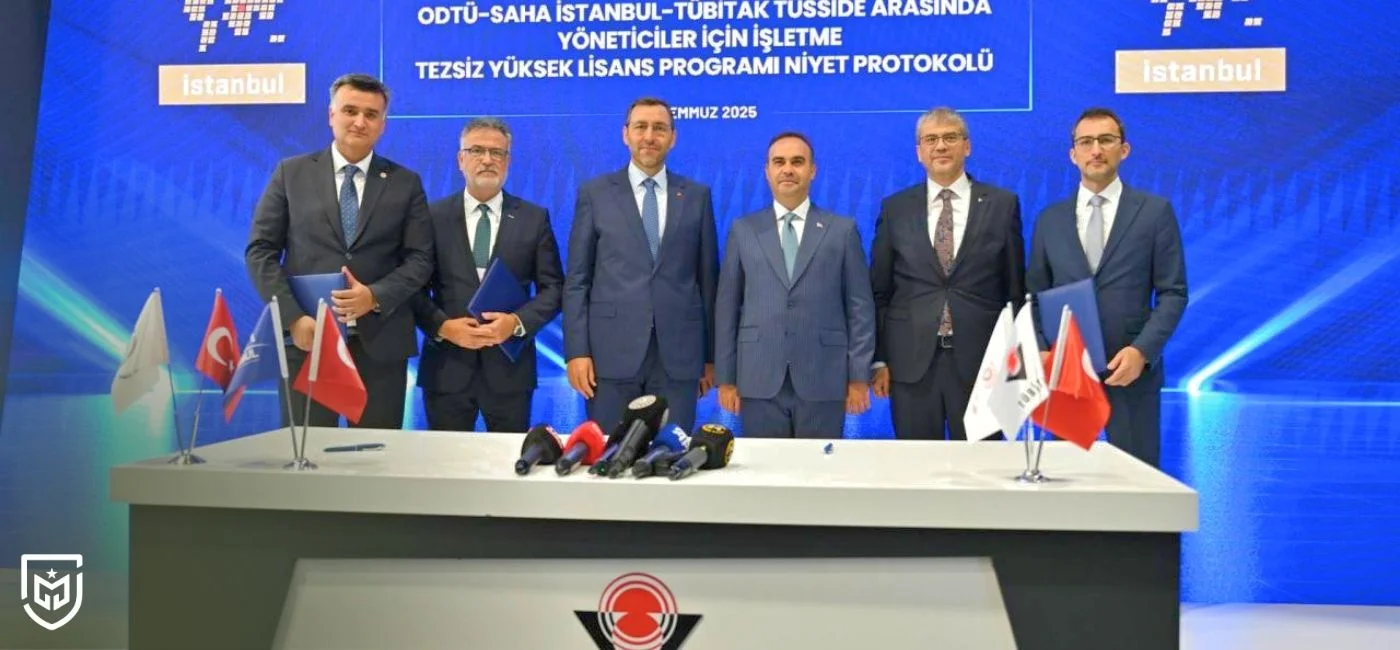

BREAKING NEWS

During the 17th International Defense Industry Fair (IDEF 2025), TÜBİTAK formalized eight major cooperation agreements with leading Turkish defense and technology institutions. Attended by Minister of Industry and Technology Mehmet Fatih Kacır, the signing ceremony marked a significant step forward in advancing Turkey’s national capabilities in cloud computing, cybersecurity, space technologies, and smart munitions.
The first series of agreements were signed between TÜBİTAK BİLGEM and HAVELSAN. These include the “TSK Cloud Computing System Project Phase-1 Safir Cloud Integration and Multi-Cloud Platform Development Contract,” “Technical Support Services Agreement,” “Ethernet Crypto Device (EKC-100G) Development Contract,” and a “Port (MYS) Product Promotion and Marketing Cooperation Agreement.”
BİLGEM President Assoc. Prof. Ali Görçin announced that the 100% locally developed Safir Cloud system will form the backbone of the Turkish Armed Forces’ cloud infrastructure, integrating national encryption and data security systems. He added that a tablet-format cryptographic device has been designed for use in the field, enabling faster and more secure communication. Görçin also revealed that the next version of Pardus OS will transition to an LLM-based operating system, expanding the role of open-source software across public and private sectors.
The fifth agreement, signed between TÜBİTAK Marmara Research Center (MAM) and HAVELSAN, focuses on “Joint R&D and Commercialization in Defense, Space Materials, and Climate Change Technologies.” TÜBİTAK MAM Vice President Ersin Üresin highlighted ongoing projects in remote chemical agent detection, space-grade solar panels, biosensors, and high-temperature turbine blades, emphasizing that the collaboration aims to strengthen R&D and production synergy in high-tech materials.
In another milestone, TÜBİTAK SAGE and ASFAT signed a memorandum for the production of Gökçe-83 guidance kits compatible with MK-83 aircraft bombs. The new variant will double the range — from 10 km to 20 km for UAVs and from 25 km to 40 km for fighter aircraft. Additionally, TÜBİTAK BİLGEM and ASFAT signed a cooperation protocol for the TF-2000 Air Defense Destroyer (HSHM) Project. To strengthen human capital in defense technology management, TÜBİTAK also partnered with SAHA Istanbul and Middle East Technical University (METU) to launch the “SAHA MBA – METU Master’s Program Protocol.”
These eight agreements at IDEF 2025 underline TÜBİTAK’s expanding leadership in the defense technology ecosystem — from secure digital infrastructure and cryptology to space materials and advanced munitions. The initiatives not only boost the Turkish Armed Forces’ operational capabilities but also pave the way for the commercialization of dual-use technologies across civilian industries, reinforcing Turkey’s goal of technological self-sufficiency.
Post Comment
Comments
No comments yet.
Related News
ROKETSAN and Bolu Abant İzzet Baysal Üniversitesi Forge Strategic Partnership to Strengthen Türkiye’s Defense Industry
HAVELSAN’s AI-Powered EYEMINER System Deployed in Africa for Strategic Security Mission
Bayraktar TB3 Defies Baltic Storm: Only Aircraft to Fly in NATO’s Steadfast Dart 2026 Exercise
ASELSAN Enters the AI Era: $39 Million Annual Efficiency Gain and 730,000 Hours Saved
Turkish-Made Bayraktar UCAVs Strike Terror Targets in Burkina Faso: Power Shift in the Sahel
TCG Anamur (M-269) Arrives in Greece for NATO Mission, Conducts Commemorative Visit in Piraeus
HAVELSAN Expands to Italy: Strategic Partnership for Unmanned Surface Vessels Targets First Contract in 2026
KAAN, J-35 and F-35 Face Off in Riyadh: Chinese Media Says “We Were Overshadowed by Türkiye and South Korea”